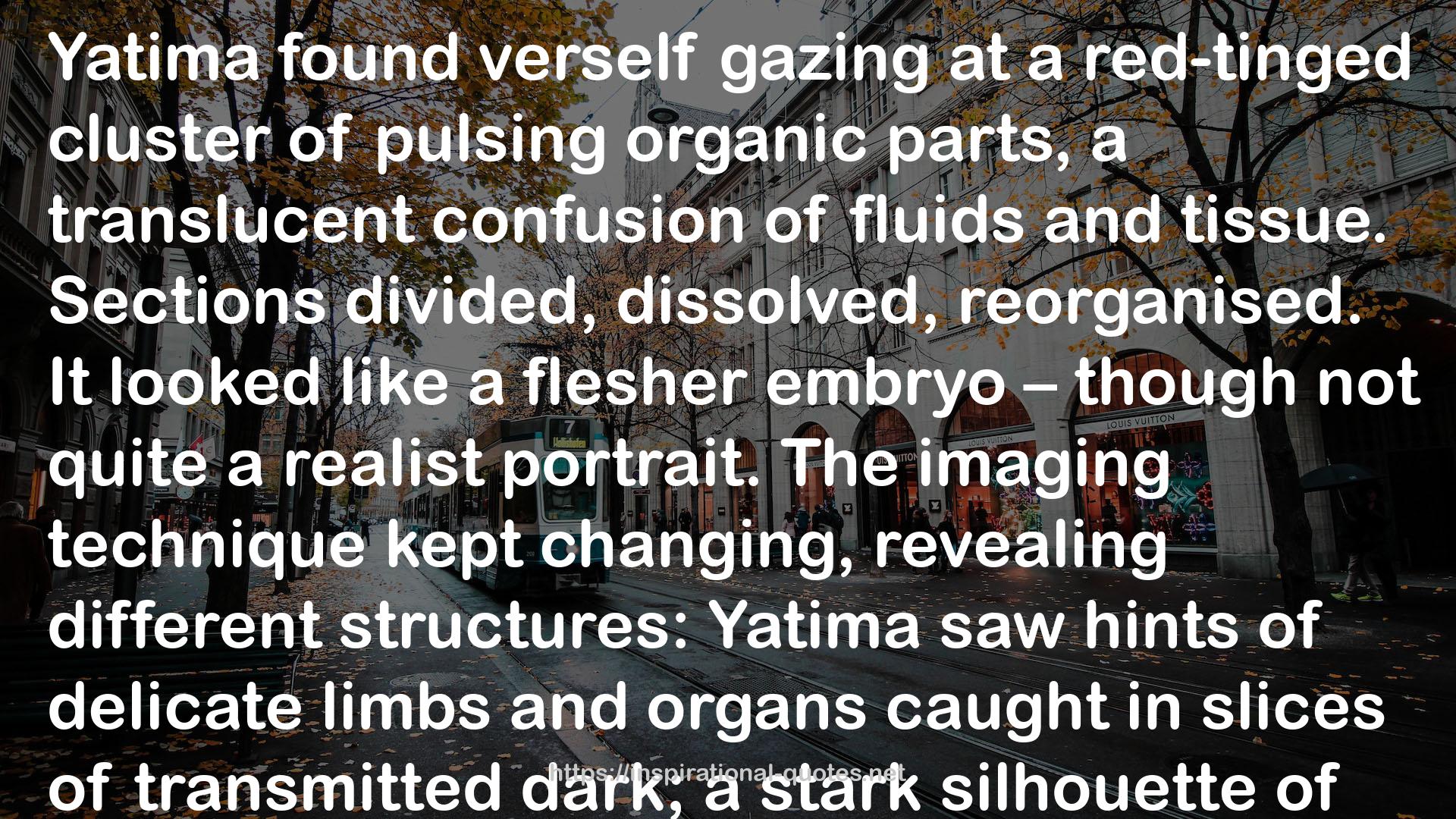1
" Yatima found verself gazing at a red-tinged cluster of pulsing organic parts, a translucent confusion of fluids and tissue. Sections divided, dissolved, reorganised. It looked like a flesher embryo – though not quite a realist portrait. The imaging technique kept changing, revealing different structures: Yatima saw hints of delicate limbs and organs caught in slices of transmitted dark; a stark silhouette of bones in an X-ray flash; the finely branched network of the nervous system bursting into view as a filigreed shadow, shrinking from myelin to lipids to a scatter of vesicled neurotransmitters against a radio-frequency MRI chirp.
There were two bodies now. Twins? One was larger, though – sometimes much larger. The two kept changing places, twisting around each other, shrinking or growing in stroboscopic leaps while the wavelengths of the image stuttered across the spectrum.
One flesher child was turning into a creature of glass, nerves and blood vessels vitrifying into optical fibres. A sudden, startling white-light image showed living, breathing Siamese twins, impossibly transected to expose raw pink and grey muscles working side by side with shape-memory alloys and piezoelectric actuators, flesher and gleisner anatomies interpenetrating. The scene spun and morphed into a lone robot child in a flesher's womb; spun again to show a luminous map of a citizen's mind embedded in the same woman's brain; zoomed out to place her, curled, in a cocoon of optical and electronic cables. Then a swarm of nanomachines burst through her skin, and everything scattered into a cloud of grey dust.
Two flesher children walked side by side, hand in hand. Or father and son, gleisner and flesher, citizen and gleisner... Yatima gave up trying to pin them down, and let the impressions flow through ver. The figures strode calmly along a city's main street, while towers rose and crumbled around them, jungle and desert advanced and retreated.
The artwork, unbidden, sent Yatima's viewpoint wheeling around the figures. Ve saw them exchanging glances, touches, kisses – and blows, awkwardly, their right arms fused at the wrists. Making peace and melting together. The smaller lifting the larger on to vis shoulders – then the passenger's height flowing down to the bearer like an hourglass's sand. "
― Greg Egan , Diaspora
6
" Amidst all this organic plasticity and compromise, though, the infrastructure fields could still stake out territory for a few standardized subsystems, identical from citizen to citizen. Two of these were channels for incoming data—one for gestalt, and one for linear, the two primary modalities of all Konishi citizens, distant descendants of vision and hearing. By the orphan's two-hundredth iteration, the channels themselves were fully formed, but the inner structures to which they fed their data, the networks for classifying and making sense of it, were still undeveloped, still unrehearsed.
Konishi polis itself was buried two hundred meters beneath the Siberian tundra, but via fiber and satellite links the input channels could bring in data from any forum in the Coalition of Polises, from probes orbiting every planet and moon in the solar system, from drones wandering the forests and oceans of Earth, from ten million kinds of scape or abstract sensorium. The first problem of perception was learning how to choose from this superabundance. "
― Greg Egan , Diaspora
9
" There’s been a revival of the old debate: with the failure of the wormholes, should we consider redesigning our minds to encompass interstellar distances? One self spanning thousands of stars, not via cloning, but through acceptance of the natural time scale of the lightspeed lag. Millennia passing between mental events. Local contingencies dealt with by non-conscious systems. I don’t think the idea will gain much support, though – and the new astronomical projects are something of an antidote. We can watch the stars from a distance, as ever, but we have to make peace with the fact that we’ve stayed behind.
I keep asking myself, though: where do we go from here? History can’t guide us. Evolution can’t guide us. The C-Z charter says ”understand and respect the universe”… but in what form? On what scale? With what kind of senses, what kind of minds? We can become anything at all – and that space of possible futures dwarfs the galaxy. Can we explore it without losing our way? Fleshers used to spin fantasies about aliens arriving to ”conquer” Earth, to steal their ”precious” physical resources, to wipe them out for fear of ”competition”… as if a species capable of making the journey wouldn’t have had the power, or the wit, or the imagination, to rid itself of obsolete biological imperatives. ”Conquering the galaxy” is what bacteria with spaceships would do – knowing no better, having no choice.
Our condition is the opposite of that: we have no end of choices. That’s why we need to find another space-faring civilisation. Understanding Lacerta is important, the astrophysics of survival is important, but we also need to speak to others who’ve faced the same decisions, and discovered how to live, what to become. We need to understand what it means to inhabit the universe. "
― Greg Egan , Diaspora

